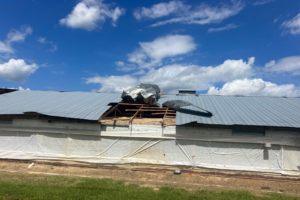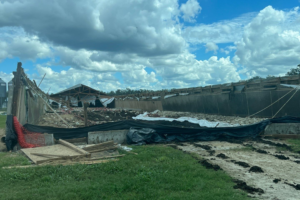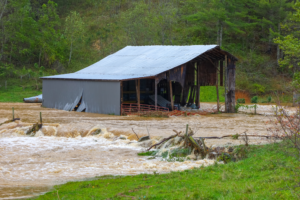An Estimated $6.4 Billion in Insured Losses, and Yet Carriers May Come Out Unscathed
When a hurricane like Helene barrels ashore, devastating homes, businesses, and entire communities, it’s easy to assume your insurance carrier will have your back. Unfortunately, that assumption could lead to financial heartbreak. For property owners, Hurricane Helene isn’t just a lesson in nature’s fury; it’s a crash course in understanding how insurance policies are designed to protect the industry’s bottom line—not yours.
The Importance of Flood Insurance
After Hurricane Helene, those without flood insurance may face another catastrophe altogether. Only 20% of property owners have flood insurance in the state of Florida. Robert Gordon, Sr. Vice President of Policy, Research and International for the American Property Casualty Insurance Association, reported, “Unfortunately, fewer than 1% of the homeowners in the most impacted areas outside of Florida had flood insurance.” The absence of this coverage can lead to overwhelming challenges when recovering from storm damage. You may be thinking, if someone knows they live in an area prone to flooding, shouldn’t they know to have flood coverage in their policy? I wish it was that simple, but for most, it’s not.
Molly Taft from Wired noted, “Flooding is not unprecedented in the mountains of North Carolina—Hurricane Ivan swept through Appalachia in 2004, and flash floods from rivers are not unheard of. Purchasing flood insurance is mandatory with a government-backed mortgage in some areas of the country, based on flood zones set by FEMA. But the data is based on extremely outdated floodplain maps that have not taken the most recent climate science on record rainfall into account.”
In addition to this, USA Today reports, “Flood insurance through the National Flood Insurance Program costs roughly $1,000 per year on average. And that’s on top of traditional property owners insurance, which saw double-digit growth in 2023, according to S&P Global Marketing Intelligence.” This underscored the reality that while flood insurance may be necessary to prevent financial devastation—it isn’t attainable for most people.
Ground or Sky? The Fine Print of Your Financial Destruction
In the wake of Hurricane Helene’s destruction, many property owners are grappling with the lack of coverage under their insurance policy. While you might assume you’re protected, the truth is many are unprepared for the intricacies of their policies.
Understanding the distinction between storm surge and wind-driven rain is crucial. If water enters your property through a hurricane-induced opening-like a broken window or a hole in the roof—your policy may cover the damage. But things may not be as straightforward if the water comes from a storm surge flooding your neighborhood.
And let’s be honest—who has the time or energy to read through the fine print of their insurance policy? The jargon used by insurance carriers can be confusing, and they have designed policies that make it harder for you to claim what you’re owed when disaster strikes. Our team at Premier Claims is ready to take this step off of your plate, reviewing your policy to see how to best navigate your claim and highlight gaps in your coverage successfully. To learn more about the difference between wind and water coverage, read our full blog—Hurricane Helene Damage: Wind vs. Water Coverage.
The Profit-Driven Nature of Insurance Carriers
In the aftermath of Hurricane Helene, it’s important to recognize while communities struggle to recover, insurance carriers may remain largely unscathed. Their primary goal is to remain profitable, not provide financial relief. According to the National Association of Insurance Commissioners, many property and casualty insurers maintain a combined ratio below 100%, indicating they take in more from premiums than they pay out in claims.
Furthermore, regulations often favor insurance carriers, allowing them to adjust rates based on catastrophic risk while shifting the financial burden onto property owners. Understanding this dynamic helps empower policyholders, as it highlights the need to take proactive steps in securing the coverage you need. Remember, insurance carriers are in the business of making money, so it’s vital to advocate for your rights when disaster strikes.
We’re Here for You
In the aftermath of Hurricane Helene, we understand that many of you are facing tremendous loss and uncertainty. It’s easy to feel overwhelmed, but it’s important to remember that you’re not alone. We’re here to help you navigate the complexities of your insurance coverage and the recovery process.
Now is the time to assess your policy—understanding what is covered and what isn’t – can make all the difference. If you live in a flood-prone area, consider obtaining flood insurance for future losses. While the cost may seem daunting, it pales in comparison to the financial devastation of being underinsured after a disaster. To request a policy review from our team, you can submit a request here: Free Policy Review. If you’re looking to find a new policy to protect you in the future, we’re here to help.
If you’re afraid your claim may be denied or if you’re facing difficulties with your insurance carrier, don’t hesitate to reach out. Holding insurance carriers accountable can be a daunting task, but you have options. Our team of professionals at Premier Claims is dedicated to advocating for you and fighting for you to receive the compensation you deserve.
In these challenging times, let us stand with you. Contact us today to explore how we can assist you in picking up the pieces and moving forward. As allowed by state law and the governing departments of insurance, we work on a contingency basis, meaning there are no upfront costs—you only pay if we successfully recover funds for your claim. Let us handle the insurance process while you focus on rebuilding. Your recovery is our priority, and we’re committed to being your trusted ally during this difficult journey.



